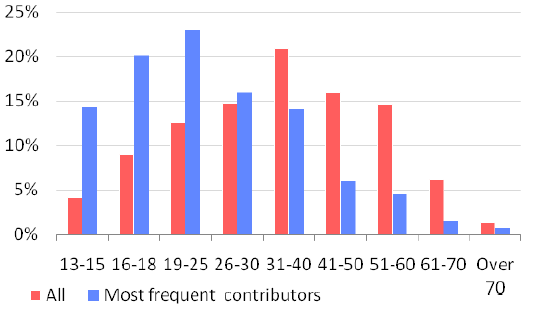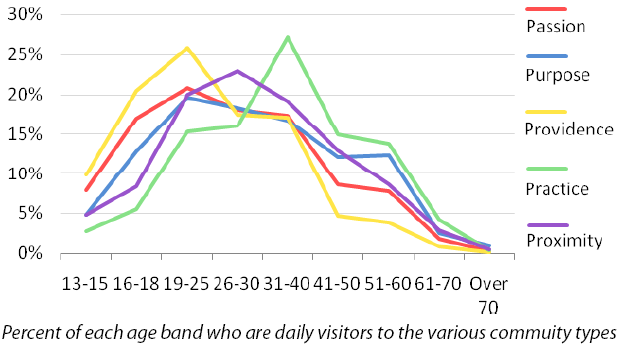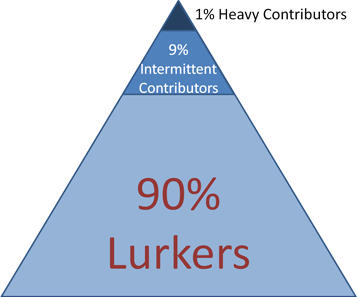Why Are Young Liberals 'Destroying the Internet'?
In the following interview of Jon Stewart, Bill O'Reilly mentioned that Jon's audience was younger and left leaning.
Recent research from a survey of 3,036 Americans confirms that people who contribute content to the web are skewed toward being young, left-leaning, and more passionate about the sites they contribute content on.


In Online Communities and Their Impact on Business [PDF] Rubicon Consulting highlights the following:
Most frequent contributors are different from the average web user. They're more ethnically diverse; more technically skilled; more likely to be single; more likely to work in technology, entertainment, or communications companies; and more likely to be Democrats. But most of all, they are younger than typical web users. Half of the web's most frequent contributors are under age 22.

The common stereotype for the Digg crowd also applies across many other sites and industries.
That's not to say you should try to appeal to the Digg audience, but if a disproportionate amount of content is created by young liberals then there is business sense in appealing to that demographic. Appealing to the 10% of people who create content makes you look better to the other 90% of people who use the web.
If you look at a traditional user adoption curve the people to the far left are the people who have blogs and the people who leave feedback on other websites. The interaction with the loud users is what helps potential customers build confidence. These loud stakeholders are influencers.
A site which has more user generated content on it has the following benefits
- a broader range of unique textual content to rank against (which helps it build a larger organic audience)
- built in social proof of value/cumulative advantage (people think it is popular, and perhaps more authoritative, because others contribute to the site)
- built in loyalty (people who contribute to your site have a vested interest in spreading the word about your site, and seeing to the success of your site)
- more editorial reviews that turn searchers into shoppers into buyers (reviews increase consumer confidence and make them more likely to purchase)
- more inbound links (people are more likely to link at a page full of editorial reviews, and the people who review products are more likely to own websites)
- faster and cheaper market feedback
- a broader reach with new releases (particularly if you build an audience by offering an email newsletter or a regularly updated blog)
- lower traffic acquisition costs, lower marketing cost, and higher value per visitor (due to many of the above points)
The Rubicon research also states that young people are more likely to be influenced by online reviews, and are more likely to search online for support issues...so having a search accessible FAQ section can drastically lower customer support costs.




Comments
Hi Aaron,
Curse of knowledge? In the first graphic with the age demographics for readers outside of the US, red will tend to mean "left".
The first graph was of frequent contributors vs all users. I probably should have put in a graph about party affiliate as well...but all the graphs are from that PDF named Online Communities and Their Impact on Business.
In the UK, we don't have the campaigning like you do in the States, especially online.
My perception is that this is majorly lacking (the online part) in any decent democracy. it's cheap it's where the traffic is and it creates debate.
We do have things like, http://petitions.number10.gov.uk/, but even so Political social debates and campaigning don't really take place like they should. As a general point, the UK youth aren't too passionate or involved in Politics either.
I'd personally love to see more critique and analysis by younger 'thought-provoking leaders' online [regarding politics] - people that I could relate to, maybe. Not going to happen soon, but needs to be addressed.
I often follow US Politics, and the gazillion $$$'s that are spent on campaign trails, but online campaigning certainly makes a great deal of sense.
Back to the more general point in hand, about user-generated content, I had started making notes on a blog post for one of my clients on just the topic. Credibility (and traffic) comes with community!
And put me in the 1% category! ;) An SEO Book brand evangelist for sure!
I don't think the technographics of this group is anything new, but the figures are interesting to see in black and white. Obama campaign obviously cornered the market on this group with their community -- the differences in the candidates online campaigns are stark!
I do think online communities are going to become a lot more common but, unlike with 'corporate blogging', there seems to be a lot more risk to the brand involved. So it will be interesting to see what entrepreneurs do with this information.
About Gen-y. Last year the big story was how they are all spoiled, expect more PTO, etc. etc, -- and now they're internet-destroying liberals? What's with the sour grapes?
I was trying to be funny with the headline, but it turns out most people don't share my sense of humor.
The people who add content to the web and guide others are building the web, not destroying it...but my irony was funny only to me :(
Just sticking up for the 25 and under, Aaron. Hell I turn 26 next week anyway. :)
Cheers.
...ooops, missed that one...I responded a bit off topic anyway, but highlights the opportunities available...
With what has been mentioned above, how do you feel this will influence younger professionals when seeking online marketing careers? Do you view those below the age of 25 with having an advantage/disadvantage? Or do you feel using a tool doesn't always mean you understand it? Where have you seen exceptions?
I don't think your physical age matters anywhere near as much as your creativity, your passion, your perspective, your experiences, your skills, and your social connections.
Lots of young people in the United States are intellectual sloths, and will pay for it dearly in the coming decades. But the curious ones who follow their passions and make connections will do quite well.
I'm pretty sure that as today's young liberals age, many (not saying a majority) will shift in their political views and continue to interact with the internet but express a more conservative viewpoint.
Winston Churchill expressed this idea most succinctly as
"If a man is not a liberal at age 20, he has no heart. If a man is not conservative at age 40, he has no brain."
Just insert the word "blogger" after liberal and conservative, and voila. Wait 15 years and I'm sure we'll see greater conservative adoption of the internet as a political medium. Good or Bad? Well, its probably always better when no one viewpoint dominates a medium.
I totally agree with you Matthew...and I tend to think that the political labels are quite arbitrary in nature...which is perhaps part of the reason why I find some sharp responses one gets anytime they talk about politics as being a bit humorous.
Add new comment